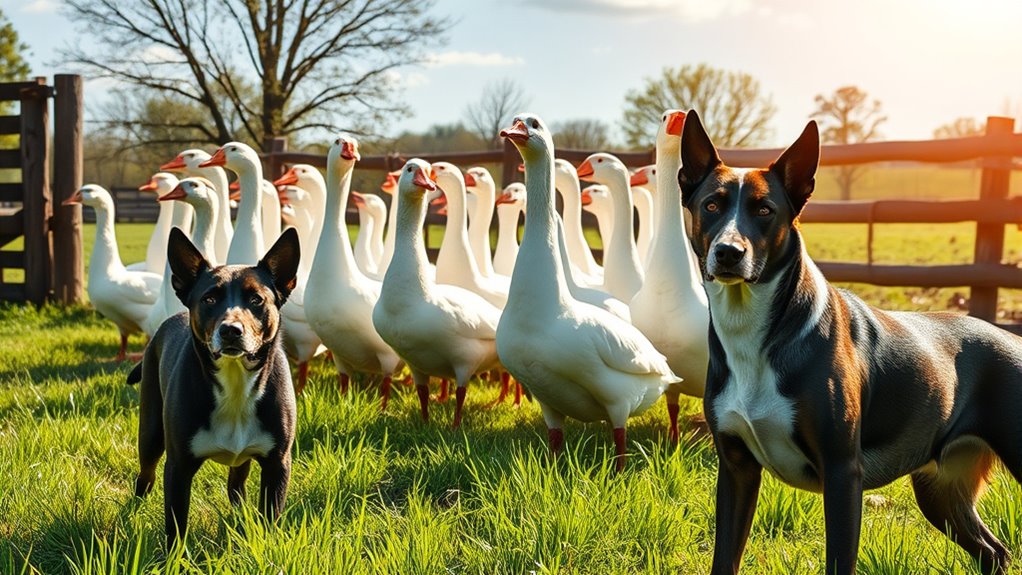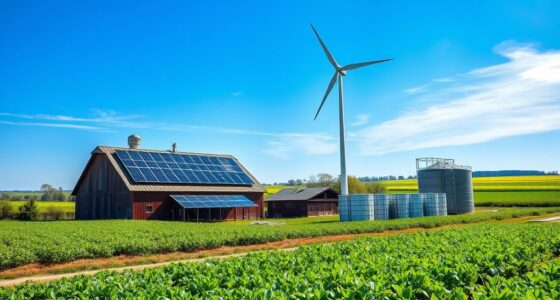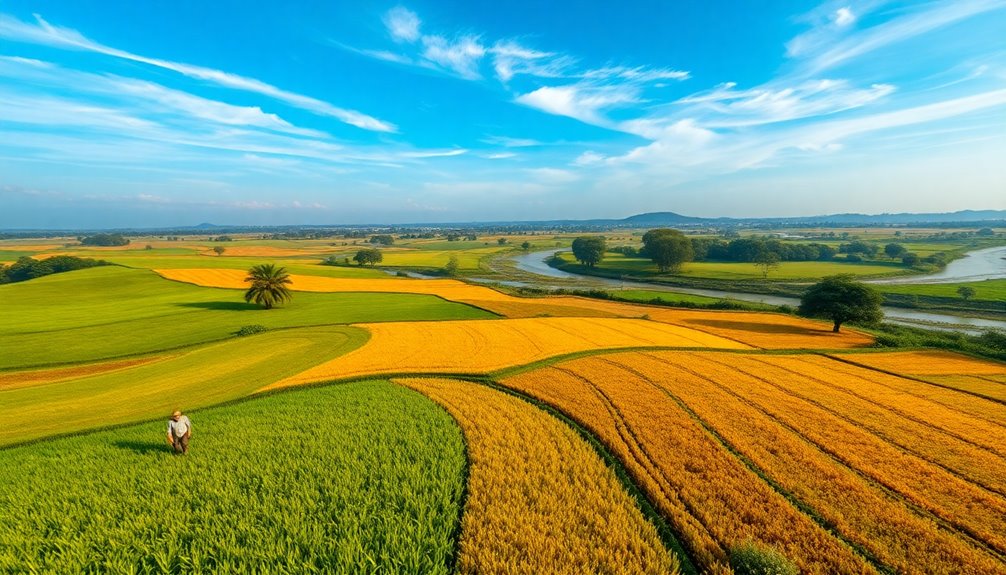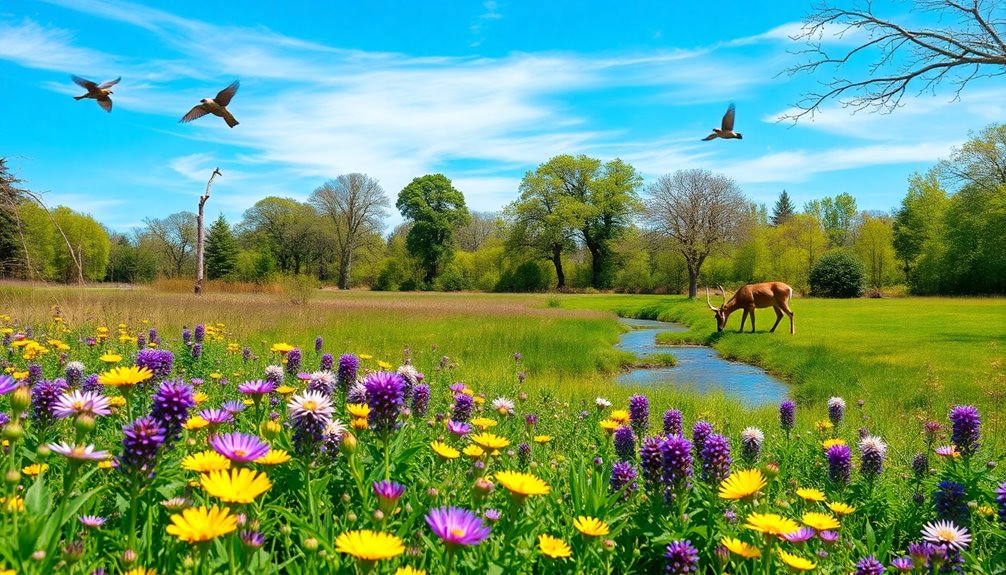When deciding between guard geese and dogs for your farm, consider their strengths. Geese are low-maintenance, cost-effective, and excel at alerting you to small threats, while dogs provide robust protection against larger predators. Geese require minimal training and less space, making them easier to manage. However, dogs can confront danger directly. Each option has its pros and cons based on your needs, so exploring their unique qualities will help you make the best choice for your farm's safety.
Key Takeaways
- Geese are low-maintenance, cost-effective, and instinctively guard, making them suitable for farms with smaller threats.
- Dogs provide direct protection against larger predators and can patrol areas effectively, requiring training and care.
- Geese excel at scaring off smaller threats and offer early warnings of aerial predators, while dogs confront larger dangers.
- Geese have lower initial and annual maintenance costs compared to dogs, making them a more economical long-term choice.
- A combination of geese and dogs can enhance farm security, balancing alertness and active defense, but requires careful integration and management.
Overview of Guarding Options
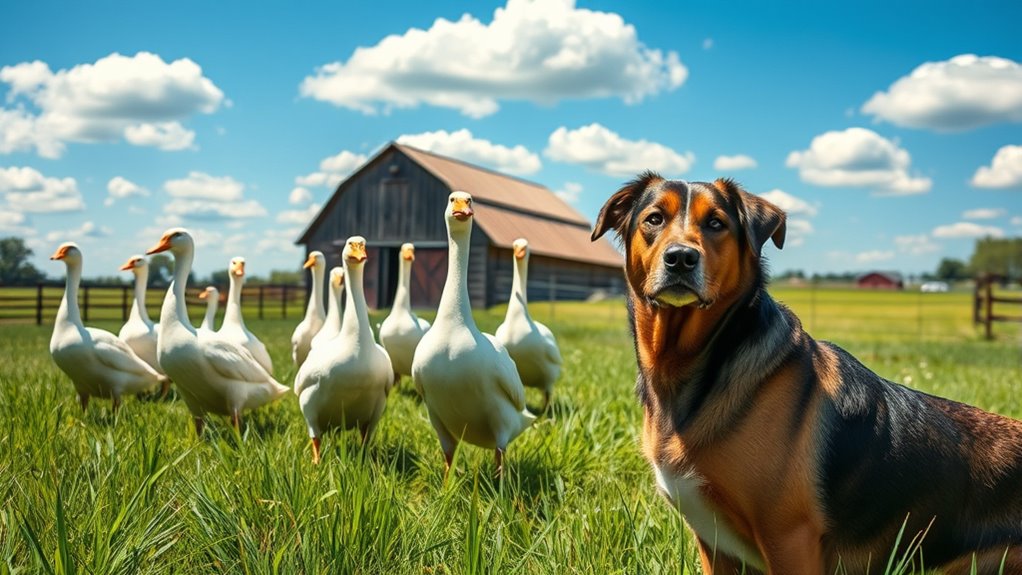
When considering options for guarding your farm, it's essential to weigh the benefits of geese against those of dogs.
Geese are relatively low-maintenance; they require secure fencing, a water source, and grassy areas. In contrast, dogs demand regular training and extensive care.
Geese require minimal upkeep with secure fencing and water, while dogs need consistent training and care.
With a lifespan of 15-20 years, geese can be a long-term investment, and their initial cost is often lower than that of guard dogs. Geese instinctively guard without needing specific training, while dogs require extensive instruction to be effective.
Additionally, geese are loud and alert, making them effective alarm systems. However, they do need ample space to roam, whereas dogs can adapt to smaller areas, making your choice depend on your farm's layout and regulations.
Effectiveness Against Predators
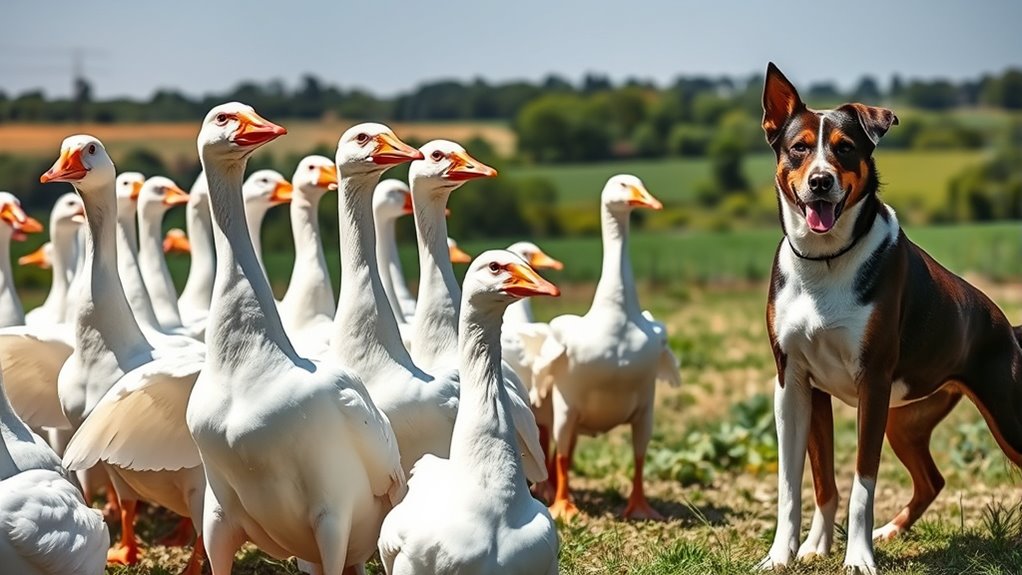
While both geese and dogs serve as effective guardians for your farm, their strengths and weaknesses vary significantly when it comes to deterring predators.
Geese excel at scaring off smaller threats like skunks and rats with their aggressive behavior and keen eyesight, providing early warnings of aerial predators. However, they're less effective against larger predators such as coyotes, often fleeing when faced with danger.
On the other hand, dogs, especially larger breeds, can physically confront these larger threats and are versatile due to their ability to be trained for specific situations.
Though geese create noise to alert you, dogs can patrol and defend your property with more direct protection, making them a more reliable choice for diverse predator threats. Additionally, having a support system in place, such as a trained guard dog, can enhance your farm's overall security against potential dangers.
Training and Handling Requirements
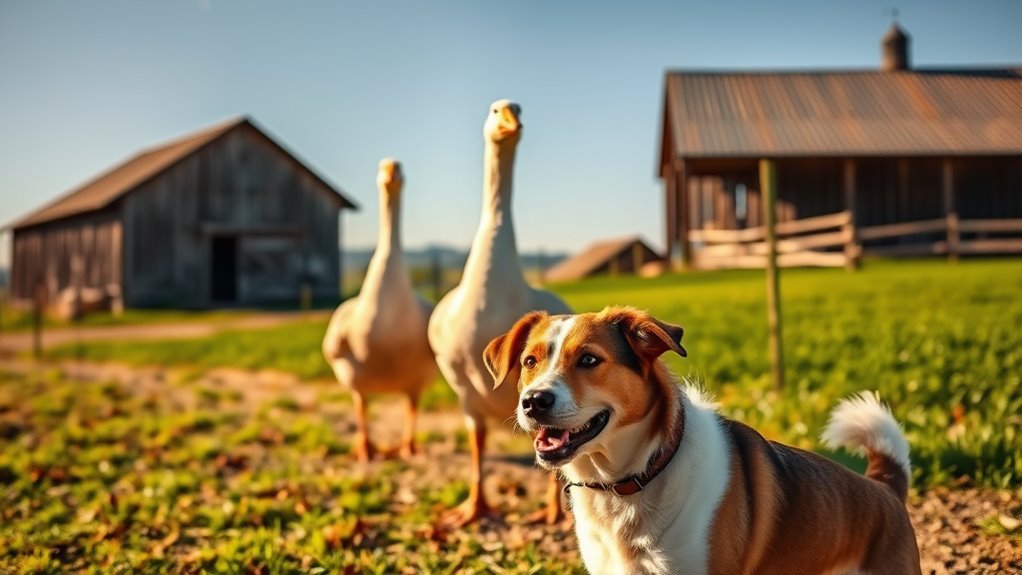
Understanding the training and handling requirements for guard geese and dogs helps you make informed decisions about which guardian is right for your farm.
Geese rely on natural instincts, imprinting on their "family," which makes them protective of their territory. They require minimal training, mainly focusing on socialization to reduce aggression.
Geese are instinctually protective, relying on family bonds and requiring minimal socialization training to manage aggression.
In contrast, dogs need structured obedience training and protection training to respond adequately to threats. They also require regular exercise and consistent handler interaction to build trust.
While both can exhibit aggression, geese are generally less trainable in this aspect.
Maintenance and Care Considerations
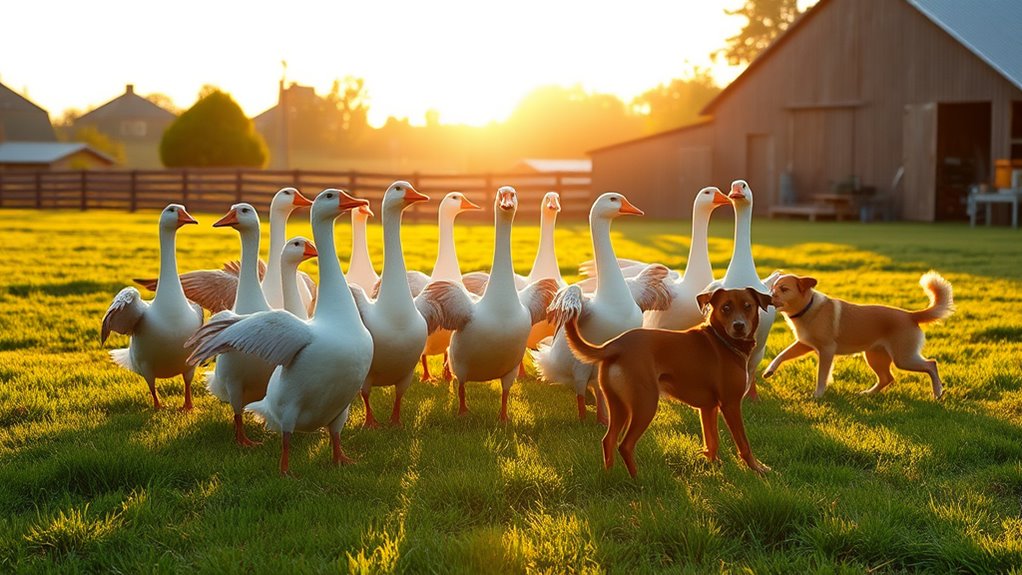
To maintain a healthy and productive flock of guard geese, you'll need to consider several key aspects of their care.
First, ensure they've ample outdoor space to roam and exercise. Their diet should be rich in grasses and grains, and they'll benefit from foraging.
Regularly monitor their health for issues like bumblefoot and parasites. Access to clean water for swimming is crucial for their well-being.
Since geese are social animals, they thrive in a flock environment. Daily cleaning of water sources is essential, with deeper cleaning weekly to prevent disease.
You'll also need to manage mud and provide sturdy fencing for their protection.
Longevity and Lifespan Comparisons
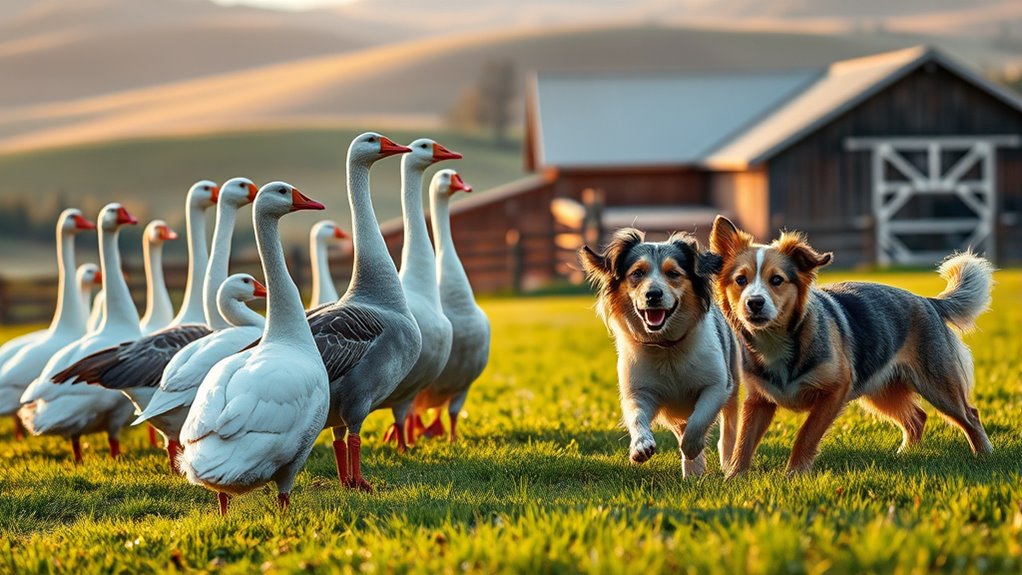
When considering guard animals for your farm, longevity and lifespan are crucial factors that can influence your decision.
Geese typically live between 10 to 20 years in the wild, but with proper care, domestic geese can thrive for up to 30 years or more.
Domestic geese can thrive for 30 years or more with proper care, offering long-term protection for your farm.
On the other hand, dogs have an average lifespan ranging from 10 to 17 years, depending on their breed and size. Larger breeds often have shorter lifespans, while some smaller breeds may exceed 15 years.
Both geese and dogs benefit from good nutrition and healthcare, which can extend their lives.
Ultimately, geese may offer longer-term protection, while dogs provide active defense, making your choice dependent on your specific farm needs.
Environmental Impact Analysis
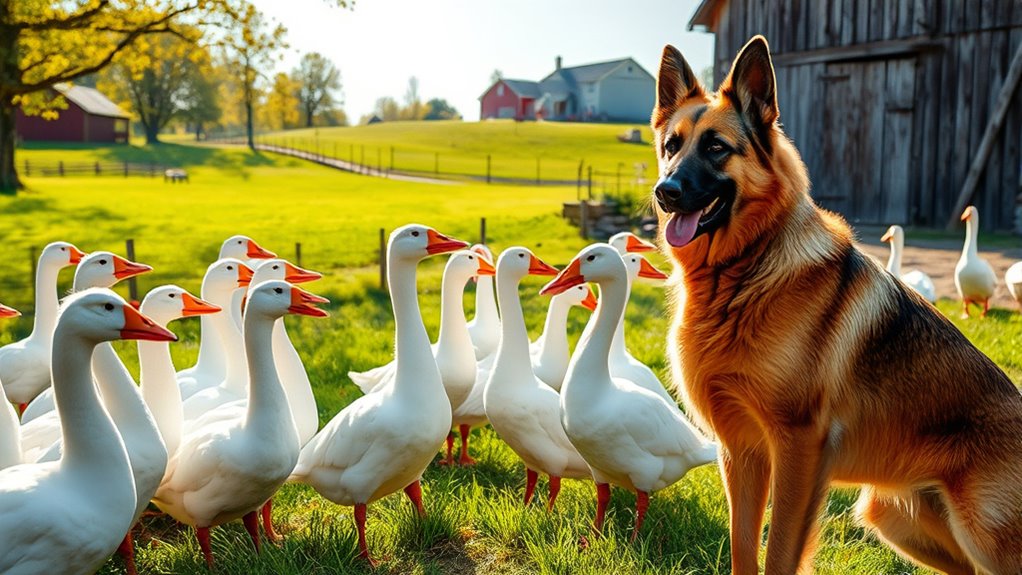
While both geese and dogs can serve as effective guard animals, their environmental impacts differ significantly.
Geese are efficient foragers, reducing your reliance on external feed sources while acting as natural weeders that promote biodiversity. Their manure enriches the soil, enhancing overall ecosystem health. Plus, geese require less water than dogs, making them ideal for water-limited farms.
However, overabundant geese can damage crops and lead to soil erosion.
On the other hand, dogs consume more resources and don't contribute to land management. They also produce waste that doesn't fertilize the soil.
In terms of ecosystem services, geese clearly have the upper hand, supporting biodiversity and improving soil health more effectively than dogs.
Cost Considerations for Farmers
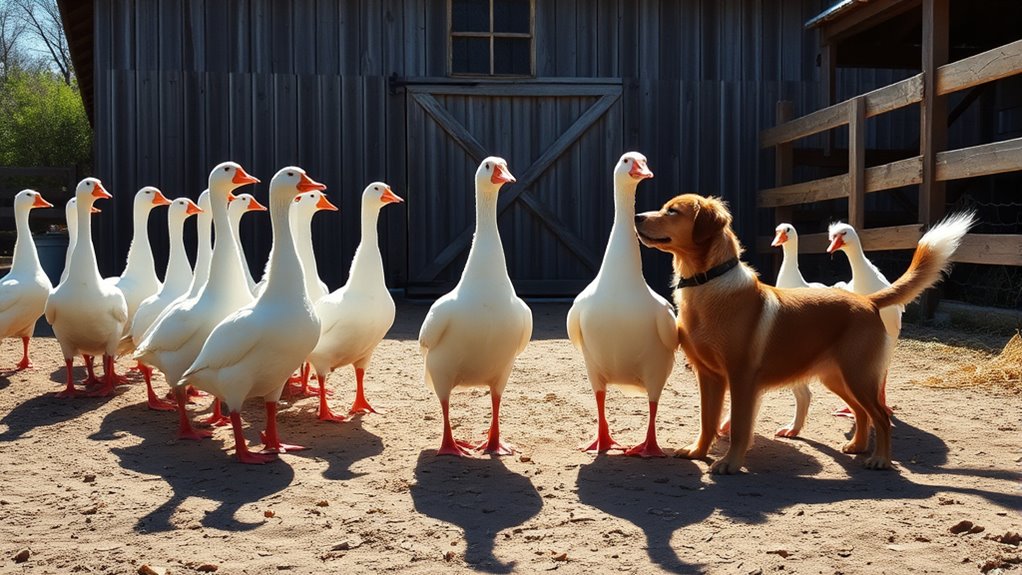
Choosing between geese and dogs as guard animals involves careful consideration of costs, since both options come with unique financial implications.
Initially, adult geese range from $50 to $140, while dogs often exceed this cost. Geese also require less annual maintenance, typically under $100, compared to over $450 for dogs. Budget planning is crucial for farmers to manage these expenses effectively. Moreover, understanding tax incentives for retirement savings can aid in long-term financial decisions for farmers.
Feed costs for geese can be minimized through free-ranging, whereas dog feed can be pricier depending on the breed. Additionally, geese generally need less veterinary care, averaging under $100 annually, while dogs may incur higher medical expenses.
Ultimately, geese can be a more economical choice in both initial investment and long-term upkeep, providing effective guarding capabilities with lower overall costs. Furthermore, long-term financial planning is essential when choosing any livestock investment to ensure sustainability.
Space and Habitat Needs
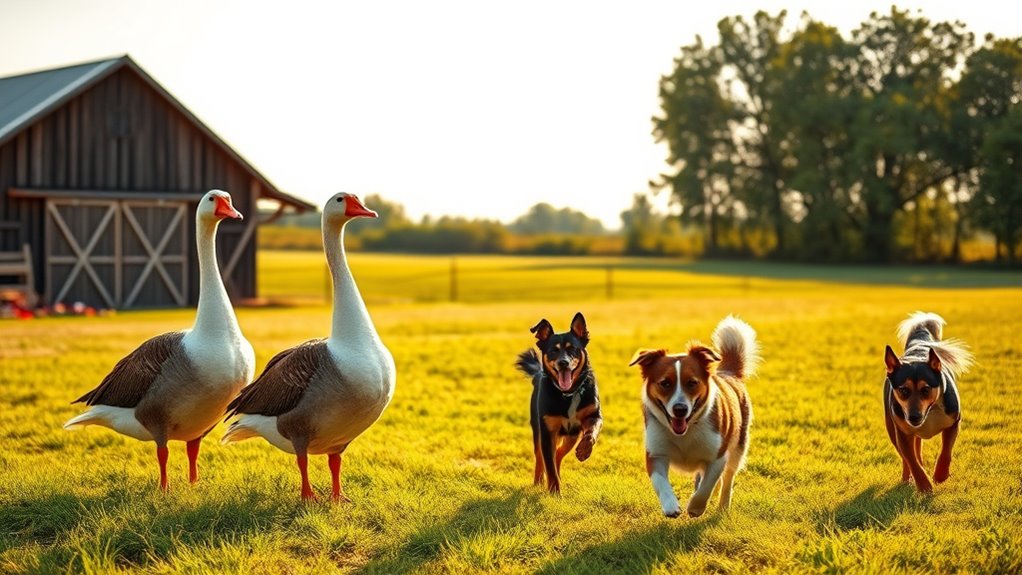
Cost considerations play a significant role in deciding on guard animals, but understanding their space and habitat needs is just as important for ensuring their effectiveness.
Geese require about three to eight square feet each in their night shelter and can thrive on an acre of grass, supporting 20-40 birds. Their shelters should be sturdy and well-ventilated, with secure fencing to keep predators out.
Geese need 3-8 square feet per bird in sturdy, well-ventilated shelters, thriving on an acre of grass.
Dogs, on the other hand, need more exercise space and a secure environment to prevent escape. They also require specific shelter depending on their breed and climate.
While geese utilize pastures efficiently, dogs need designated training areas and social interactions.
Assessing these needs will help you choose the right guardian for your farm.
Integration With Other Farm Animals
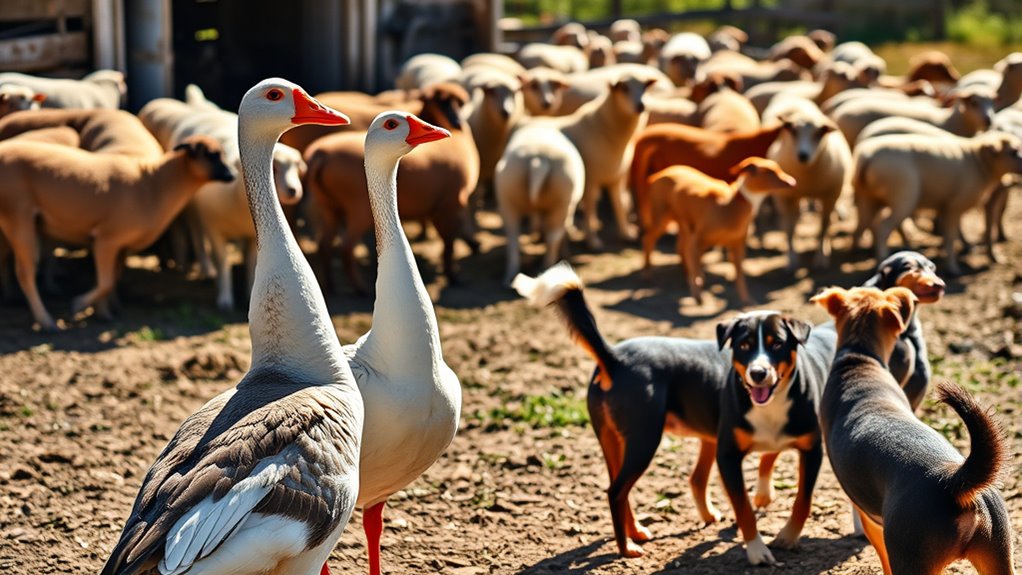
Integrating guard geese and dogs with other farm animals can enhance overall security and promote a harmonious environment.
While geese can bond well with poultry, their aggression during mating season might create conflicts. They serve as natural alarm systems, but their noise levels can disturb other animals or neighbors. Additionally, animal husbandry skills are essential to manage the interactions between geese and other livestock effectively.
On the other hand, dogs can form strong bonds with livestock and offer more aggressive protection against predators.
Combining both creates a complementary system: geese alert you to danger while dogs actively defend. However, be mindful of breed selection and socialization to minimize integration challenges. Additionally, ensuring proper emergency preparedness essentials can further enhance the effectiveness of both guard geese and dogs in maintaining farm security.
A well-managed mixed system can ensure a safer, more sustainable farm environment for all animals involved.
Frequently Asked Questions
Can Guard Geese Coexist Peacefully With Other Livestock?
Yes, guard geese can coexist peacefully with other livestock if you manage their integration properly.
Start by introducing goslings to your existing animals early, fostering bonds that promote harmony.
Ensure there's enough space for each species to thrive and provide separate feeding areas to prevent competition.
With their natural guarding instincts, geese can protect your flock while blending in seamlessly with your other livestock, creating a balanced and secure environment.
What Are the Best Goose Breeds for Guarding?
If you're considering geese for guarding, look into African Geese, White Chinese Geese, and Embden Geese.
African Geese are large and loud, making them excellent alarm systems.
White Chinese Geese aren't only good guards but also prolific egg layers.
Embden Geese have an aggressive nature during breeding season, enhancing their protective instincts.
Each breed offers unique advantages, so think about what fits best with your needs and farm setup.
How Do Guard Geese Handle Extreme Weather Conditions?
When it comes to handling extreme weather, guard geese adapt well to both cold and hot conditions.
In winter, their downy coat keeps them insulated, and they just need a simple shelter to shield them from harsh winds.
In summer, make sure they've plenty of shade and fresh water to cool off.
Are There Any Legal Restrictions on Keeping Guard Geese?
When considering keeping guard geese, you might think of their protective instincts and cost-effectiveness, but legal restrictions can complicate things.
You'll need to understand federal protections under the Migratory Bird Treaty Act, which require permits for managing them. State regulations also come into play, often needing proof of damage for permits.
How Can I Introduce Guard Dogs to My Farm?
To introduce guard dogs to your farm, start by using bonding pens to place pups with calm livestock, allowing them to bond safely.
Supervise their interactions and gradually expose them to larger areas. Monitor their behavior closely and correct any unwanted actions early on.
Teach basic commands and expose them to farm life, ensuring they're comfortable.
Regular health checks and vaccinations are crucial for their well-being and effectiveness as guardians.
Conclusion
In deciding between guard geese and dogs for your farm, consider that geese can reduce predator attacks by up to 90% while being more cost-effective over time. Dogs may require more training and care, but they offer loyalty and companionship. Ultimately, your choice should reflect your farm's specific needs and environment. Whether you choose feathered or furry protectors, both can play a vital role in keeping your livestock safe and thriving.

